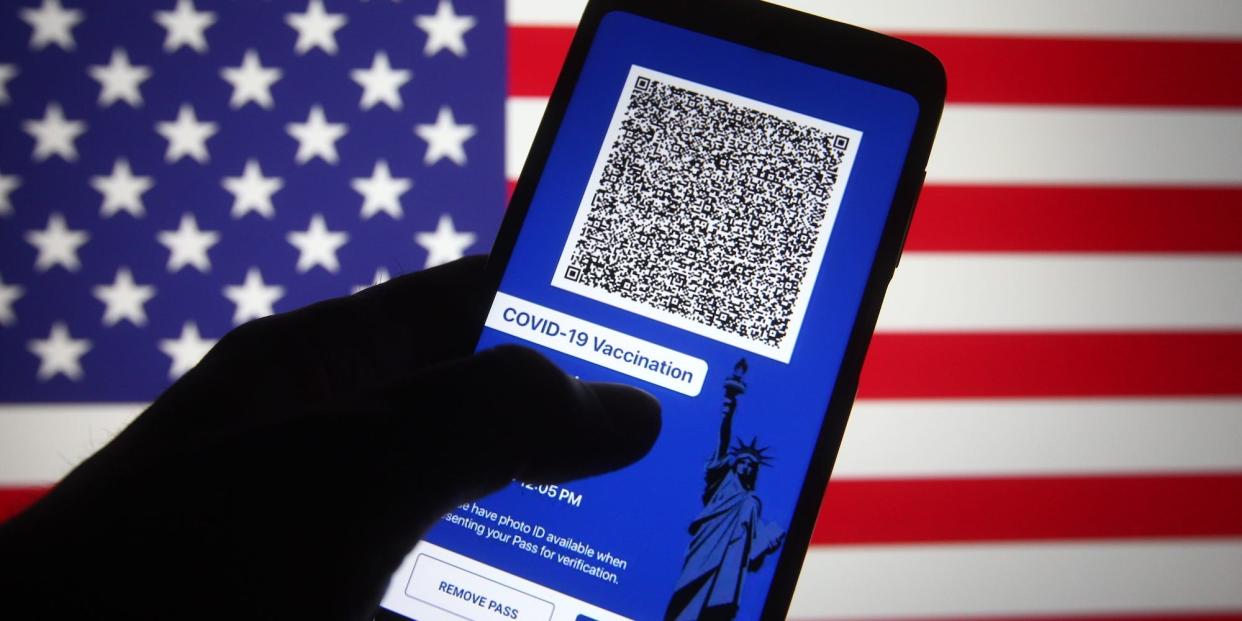Republicans slam vaccine passports as dystopian, but experts say they'll help us get back to normal faster

Republicans are pushing against the use of vaccine passports, decrying them as authoritarian.
But experts say that digital health passes could get us back to normal more quickly.
A vaccine passport "can make all the things we love to do safer," one expert told Insider
As more and more Americans get vaccinated, Republicans are increasingly pushing back against local governments and businesses instituting the use of "vaccine passports."
GOP lawmakers and leading conservatives have decried the move as akin to intrusive surveillance tactics employed by the Chinese government, but health experts say this is overblown and that some form of digital health pass could be crucial in bringing a sense of normalcy back to the US.
"Vaccine passports, if done right and done equitably, can be way to help us get back to normal more quickly. It can make all the things we love to do safer: travel, going to a sporting event, getting back to work," Lawrence Gostin, director of the O'Neill Institute for National and Global Health Law at Georgetown University Law Center, told Insider.
"What we've seen in this pandemic is that anything can be politicized, whether it's a mask or vaccine, whatever it might be. But the truth is that vaccines are not only our best way out of this pandemic, they're our only way out of this pandemic - because it's clear that we can't change our behavior," Gostin went on to say.
Vaccines will eventually get us to herd immunity and "we'll be back to normal anyway," Gostin said, but added that "in the interim we can get back more quickly with some kind of a digital health pass."
Conservatives call vaccine passports 'dystopian'
The criticism of vaccine passport initiatives and proposals from GOP figures comes as Republican voters exhibit higher levels of vaccine hesitancy than other groups.
Donald Trump Jr. in a tweet on Monday said that "authoritarian leftists want a Chinese-styled social credit system here in America," adding that vaccine passports via the government or private sector "would create a two-tiered caste system."
Former Rep. Justin Amash, a libertarian-leaning ex-Republican who became an independent before he left Congress earlier this year, tweeted, "No vaccine passport. It doesn't get much more dystopian than being required to show your 'health papers' wherever you go."
But Amash faced swift pushback, particularly given requiring proof of COVID-19 vaccination would not be especially different from immunizations that have already been mandated for travel to various countries over the years. Not to mention, all 50 states have legislation that require certain immunizations for public school children.
Along these lines, Democratic Sen. Brian Schatz told Amash that he respects him "immensely" but added that "we already do this and it's fine."
Ron DeSantis, the Republican governor of Florida, pledged to take executive action to ban the use of vaccine passports in his state. "It's completely unacceptable for either the government or the private sector to impose upon you the requirement that you show proof of vaccine to just simply be able to participate in normal society," DeSantis said Monday.
Some experts are also concerned about vaccine passports, but say they can work if done right
Beyond the politicization of this issue by Republican lawmakers, some health experts and civil liberties groups have also expressed concerns that vaccine passports could have a negative impact on already marginalized groups.
The American Civil Liberties Union (ACLU) raised ethical questions surrounding "immunity passports" as early as May 2020, long before any vaccines were approved, warning that they "could exacerbate existing racial disparities, harming workers of color and people with disabilities in particular."
Months into the distribution of vaccines, experts continue to voice similar worries.
"Immunity passports promise a way to go back to a more normal social and economic life, but the benefits they generate will be dispersed unequally, and it is not obvious that they are ethical," Nicole Hassoun and Anders Herlitz, scholars of public health ethics, wrote in Scientific American earlier this month.
"On the one hand, immunity passports offer an opportunity for employees to go back to work and families to reunite," they wrote. "On the other hand, they will not be available to everyone, and they will exacerbate existing inequalities."
The World Health Organization has also said it does not support requiring proof of COVID-19 vaccination for international travel, citing the limited availability of vaccines.
Governments across the world have discussed requiring some form of proof of vaccination in order to travel and participate in other activities, and they've already been implemented in some places.
Last month, vaccinated Israelis started getting a "green pass" that allows for access to venues and events. European leaders have backed the use of a "Digital Green Certificate" that would provide digital proof of vaccination and permit travel within the EU.
The White House on Monday said it would leave the matter of vaccine passports up to the private sector.
Meanwhile, New York on Friday became the first state in the country to introduce a vaccine verification app, which was tested earlier in the month at Brooklyn Nets and New York Rangers games. New York is opening up vaccine access to all adults in early April.
Gostin underscored that equitable distribution of vaccines is crucial to requiring some form of a digital health pass.
"It has to be done right. We can't do it while you have vaccine scarcity," Gostin said. "You have to make sure you have enough vaccines so that everyone who wants a vaccine can get a vaccine, otherwise it's grossly unfair. And even then you need to make sure that you're not leaving anybody behind - people who are disadvantaged and for one reason or another don't want to or can't get a vaccine. Equity has to be a big part of it."
Read the original article on Business Insider

